Annual Report 2019-2020 OVE
On this page
- Letter to the Deputy Ministers
- A Word from the Ombudsman
- Introduction
- Activities, Services and Outreach
- 2019-2020 Organizational Health Dashboard
- Observations, Analysis and Trends
- Ombud Service (38% of cases)
- Values and Ethics Service (32% of cases)
- Well-being and Disability Support Service (27% of cases)
- Harassment Service (3% of cases)
- 2019 Public Service Employee Survey
- 2020-2021 Priorities
- Food for Thought
- Annex: Support, Listening and Confidentiality
- Contact information
Letter to the Deputy Ministers
October 2020
Hélène Laurendeau
Deputy Minister, Canadian Heritage
Gina Wilson
Deputy Minister, Diversity and Inclusion and Youth, and
Senior Associate Deputy Minister for Canadian Heritage
Department of Canadian Heritage
Dear Deputy Ministers,
The last fiscal year ended in a completely unexpected fashion, plunging us into a profound transformation in terms of work organization. It is against this backdrop that I am forwarding you the 2019-2020 Annual Report of the Office of Values and Ethics (OVE).
In this report, you will find statistics related to the use of services under our responsibility and the issues that have marked the last fiscal year. You will also find observations on the challenges raised by employees and our priorities for 2020-2021 and the future.
After one year as Ombudsman, I am pleased to note how you have taken up my predecessor’s call to action by supporting the efforts of all PCH’s stakeholders in an ongoing and committed manner, in order to ensure an inclusive work environment, free from harassment and focused on well-being. Thanks to their joint efforts, PCH employees at all levels are taking greater responsibility for issues related to conflict, ethics and mental health.
However, the uncertainty and emerging issues related to COVID and to racism are of concern to me and lead me to think that these could exacerbate some latent problems in the workplace and compromise our achievements in terms of well-being and organizational health. This is why now, more than ever, we need to be kind, attentive and open. Together, we must step up our efforts regarding inclusiveness and diversity. Pooling our respective strengths in support of one another will certainly enable all of us to reach our full potential and help us strengthen the Department’s resilience.
Sincerely,
Lise Laneville
A Word from the Ombudsman

“Courage doesn't always roar. Sometimes courage is the little voice at the end of the day that says: “I'll try again tomorrow.””
This report describes a “normal” year in the Department, that is, a pre-COVID year. It is a report on the combined efforts of my predecessor, myself and especially my colleagues at the Office of Values and Ethics (OVE). It was a year of transitions for the OVE: some people left, while others joined the OVE, which entailed learning curves and opportunities.
A mere four months into my role, I ended 2019–2020 in lockdown, like all of you. I must admit I was a little in denial in the beginning, convinced that I would be back in the office in three weeks. But that thinking was short-lived. It became increasingly clear that I would be working from home, dealing with the unexpected and the challenges this entailed, for months to come.
Now, after one year into my role, two thirds of which have been spent at home, I am pleased to share a few thoughts with you about my first year as ombud at the Department of Canadian Heritage. I have been with the Department for 20 years. What I see as ombud confirms my experience as an employee: Canadian Heritage is a great place to work. This does not mean that everything is perfect, far from it; however, I see how dedicated, loyal and passionate the Department’s employees are, and I continue to be witness to these qualities in most of my interactions with employees. Even in difficult times—be it a lockdown, a pandemic, manifestations of racism, new ways of working, communicating, connecting, challenges in maintaining wellness, to name but a few—even in such moments, all people want is to work in a healthy, respectful environment and to know that their contributions are making a difference within their teams, in the Department and in communities across the country.
You may recall that early in the year, I shared my thoughts for 2020 with you, especially my thoughts on kindness, the theme I had chosen for the year, via an intranet blog. I never imagined how appropriate that theme would be this year. Overall, I am a positive person who believes in the good in everyone, and yes, I am even naive enough to believe that, with a little kindness, openness and attentiveness, everyone can help to make a difference and perform their duties in the utmost respect, but also self-reflect and change. I must admit that what has happened in the world these past few months has tested my optimism. But when I look more closely within the Department, I continue to see actions and commitment among people that renew my optimism. In the midst of such upheaval, I have been struck by employees’ resilience and Canadian Heritage’s organizational culture.
While transforming and maintaining a healthy organizational culture remains a challenge, as you will see from the observations and statistics shared in this 2019–2020 report, the Department has fostered an organizational culture focused on employee wellness that cannot be taken for granted. When this is no longer given proper attention, the door is left open to conflict between individuals. It sometimes manifests itself through the tone of a request, a lack of patience with someone who needs a bit more attention or clarification, an inappropriate joke that reflects unconscious biases or even racism or sexism, or some people being overlooked and made to feel left out.
Finally, in addition to showing kindness and being more attentive and open, perhaps we also need a bit more courage. We need the courage to acknowledge and speak out when we hear about or see unacceptable behaviour in the workplace, the courage to have difficult conversations, the courage to provide and receive feedback, the courage not take things personally, the courage to ask for help, the courage to show empathy, the courage to say no, the courage to say yes.
Lise Laneville
Ombudsman, Canadian Heritage
Introduction
Purpose of the Annual Report
Every year, the OVE prepares an annual report that summarizes the concerns raised by its users, offering a unique perspective of PCH’s organizational health and identifying key factors affecting employees and the workplace. This report is at once an awareness tool and a feedback mechanism for employees and management, with the aim of fostering discussion about how we can all contribute to a healthy and productive work environment. We are therefore asking you to read it, discuss it with your colleagues and send us your questions and comments or invite us to a team meeting so that we can present it to you.
Role of the Ombudsman
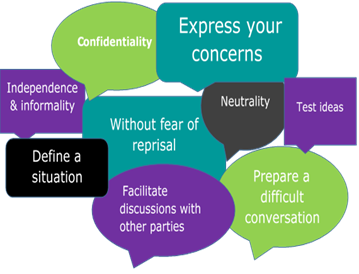
Description Role of the Ombudsman
- Confidentiality
- Express your concerns
- Without fear of reprisal
- Independence and informality
- Define a situation
- Facilitate discussion with other parties
- Prepare a difficult conversation
- Test ideas
- Neutrality
The Ombudsman function at Canadian Heritage was set up in accordance with the guiding principles and standards of practice of the International Ombudsman Association: independence, impartiality, confidentiality and informality. The Ombudsman’s role has two key functions:
- The first is to provide a safe impartial venue for all employees – regardless of employment status, level or geographical location – wishing to explore options for resolving workplace issues without fear of reprisal.
- The second is to monitor the pulse of the organization’s overall health, identifying trends, and giving upward and outward feedback to encourage a healthy work environment, respectful of people and values and ethics.
Mandate of the Office of Values and Ethics
The Office of Values and Ethics (OVE) is an impartial and independent body that provides a safe environment where employees can discuss their concerns in confidence. The OVE consists of a team of six (dynamic) individuals who report to the Ombudsman and provide PCH employees with information, advice and support, enabling them to meet personal and professional challenges in the workplace.
Activities, Services and Outreach
Workshops, training and information sessions
During the 2019-2020 fiscal year, we reached, equipped or assisted over 1,000 people working at PCH. This high volume of interactions attests to PCH employees’ confidence in our services (see Appendix). A new feature in 2019-2020 was the coordination of emotional intelligence assessments for management teams who requested them, including individual feedback and tools to help people develop their leadership skills. In addition to meeting employees at their request, the OVE organizes workshops and information sessions on a variety of topics and helps put together training sessions related to its mandate.
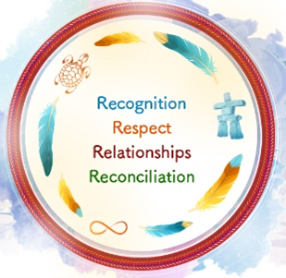
The Indigenous Learning Series
- Recognition
- Respect
- Relationships
- Reconciliation
The OVE enables a micro-assignment opportunity to one of our resources at the Canada Public Service School in support of the Indigenous Learning Series.
Collaborating in the workshops KAIROS and Reconciliation Begins with Me is an important reciprocal learning commitment that promotes dialogue through openness and authentic experiences sharing, and contributes to a greater cultural understanding among persons employed at PCH.
Highlights
- According to the OVE’s Mental Health Survey (May 2019):
- 87% of the responses indicate that PCH places importance on mental health issues compared to 51% in 2015
- According to the Workplace Mental Health Campaign: Not Myself Today!
- Utilization rate of 8.9%
- Increase in the offer of presentations by peers in order to contribute to the destigmatization of mental health through personal accounts and actual experiences
- According to the 2019 Public Service Employee Survey (PSES):
- 88% of responses indicate that PCH is doing a good job of raising awareness of mental health in the workplace (73% in the public service).
Main Workshops
| Topic | Number of participants |
|---|---|
| Values and Ethics | 36 |
| Civility | 273 |
| Workshop on 13 psychosocial factors | 128 |
| Mental health and well-being | 194 |
| Mandatory trainings: Harassment and Working Mind | 182 |
More Information
- Facilitations: 13
- Regional visits: 3 (Winnipeg, Toronto and Montreal)
- Collaboration with the following departmental initiatives: Over to you!, PSES
Participation of the OVE and the Ombudswoman in various interdepartmental committees and networks, such as: the Interdepartmental Organizational Ombudsman Council, the Informal Conflict Management System Network, the Values and Ethics Network and the Centre of Expertise in Mental Health.
Attendance of the OVE and the Ombudsman at various departmental committee meetings for a more holistic understanding of organizational health issues: GBA+, Advisory Committee on Disabilities, Departmental Committee on Accommodations.
2019-2020 Organizational Health Dashboard
The dashboard that follows provides a 2019-2020 roll-up of OVE services and activities, challenges raised by employees, and other relevant indicators, such as the number of active grievances and Employee Assistance Program usage rates. The information is presented in a generalized manner that protects the anonymity of OVE users.
Challenges raised by users

Description – Challenges raised by employers
- 372 cases raised
- Average of 2 interactions per case
- 41% visits
- 32% emails
- 26% calls
- 272 consultations with the Employee Assitance Program
- Psycholgical Health
- Family-couple
- Anxiety
- Family-children
- Stress related to work
- Labour Relations Grievances:
- 12 active as of April 1, 2019
- 13 active as of March 31, 2020
Services used
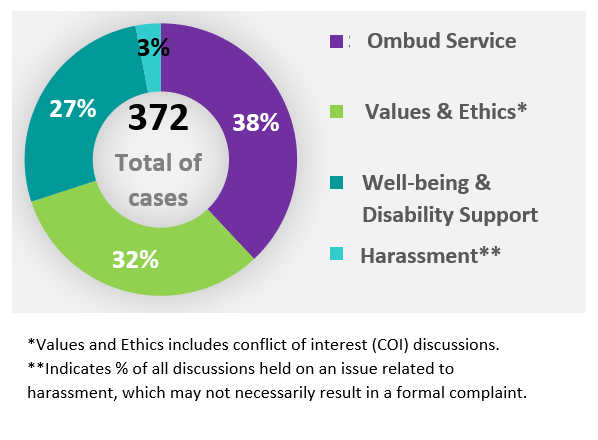
Description of Total of cases and Services used by employees
- Total of cases – 372
- Ombud Service – 38%
- Values and EthicsFootnote 1 – 32%
- Well-being and Disability SupportFootnote 2 – 27%
- Harassment – 3%
Public Service Employee Survey (PSES)
| Year | Harassment | Discrimination |
|---|---|---|
| PCH 2019Footnote 3 | 11% | 6% |
| PS 2019 | 14% | 8% |
| PCH 2018 | 10% | 5% |
| PS 2018 | 15% | 8% |
More Discussed Issues
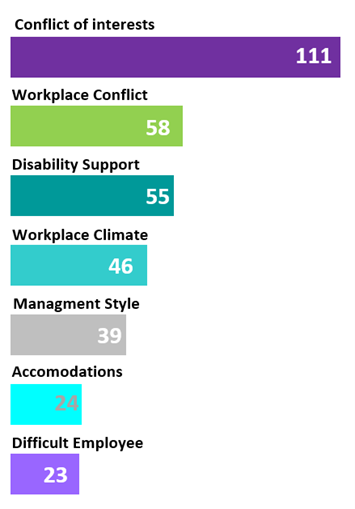
Description of More Discussed Issues
- Conflict of interests – 111 cases
- Workplace Conflict – 58 cases
- Disability Support – 55 cases
- Workplace Climate – 46 cases
- Management Style – 39 cases
- Accommodations – 24
- Difficult Employee – 23
13 Psychosocial FactorsFootnote 4
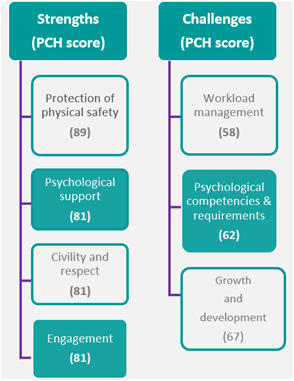
Description of 13 Psychosocial Factors
- Strengths (PCH score)
- Protection of physical safety – 89
- Psychological support – 81
- Civility and respect – 81
- Engagement – 81
- Challenges (PCH score)
- Workload management – 58
- Psychological competencies and requirements – 62
- Growth and development – 67
Observations, Analysis and Trends
Issues discussed
In 2019-2020, PCH’s organizational structure underwent major changes, and employees at all levels had to quickly adapt to new people, new management styles and new priorities while ensuring that the organization’s priorities were met. Although people are generally very committed to change, the trend toward greater work complexity—managing both horizontally (collaborative and consultative style) and vertically (hierarchical style) while meeting tight deadlines—has an impact on people’s well-being and organizational health. People do not all react in the same way when faced with professional challenges and changes. You will find below the main questions or concerns raised with the OVE.
Ombud Service (38% of cases)
Workplace Conflict
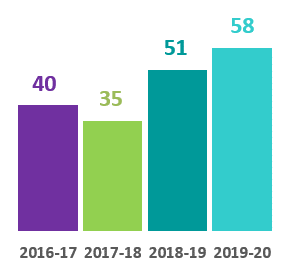
Description of Workplace conflict graph
- 40 cases in 2016-2017
- 35 cases in 2017-2018
- 51 cases in 2018-2019
- 58 cases in 2019-2020
Workplace conflicts (58 cases) are the main concerns raised during discussions in 2019-2020: 72% (42) of cases were conflicts between managers and employees, while 28% (16) of them were between colleagues.
To be better equipped and contribute to a healthy workplace climate, more and more employees at all levels are seeking our advice and attending our workshops, such as those on civility. A Toolkit also became available this year to facilitate working through conflicts and resolving them in a constructive manner.
Workplace Climate
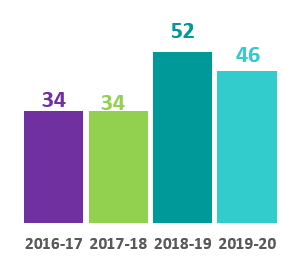
Description of Workplace Climate graph
- 34 cases in 2016-2017
- 34 cases in 2017-2018
- 52 cases in 2018-2019
- 46 cases in 2019-2020
In spite of a sincere commitment to take responsibility for building and maintaining a healthy and safe work environment, some grey areas still prevail: certain behaviours are acceptable to some but not to others, in which case people come to see us to talk about them, as they have an impact on the work climate (46 cases). Taking a stand respectfully and acting collaboratively are behaviours that can be difficult to adopt, especially in a stressful work environment with a heavy workload and tight deadlines.
While time does not always allow, setting aside a space for communicating (time, location and means used) while practicing active listening could, however, help us to understand each other and show greater openness to different perspectives.
Management Style
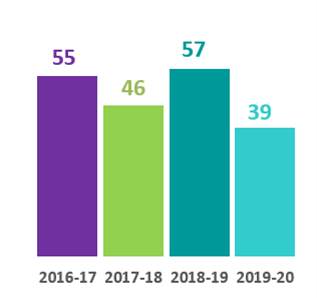
Description of Management Style graph
- 55 cases in 2016-2017
- 46 cases in 2017-2018
- 57 cases in 2018-2019
- 39 cases in 2019-2020
In an organizational context where collaborative and collegial management is promoted, there are expectations with respect to the sharing and transparency of information among all team members, regardless of their hierarchical level.
In order to deal with changing priorities and the ensuing workload, we hope to avoid a misalignment between the work objectives set by senior managers and those provided by other members of the organization.
Openly sharing expectations, providing support and allowing everyone to be more autonomous in the search for solutions so as to achieve results certainly encourages engagement while improving workplace well-being.
Difficult Employee

Description of Difficult Employee graph
- 33 cases in 2016-2017
- 28 cases in 2017-2018
- 24 cases in 2018-2019
- 23 cases in 2019-2020
Addressing issues with an employee, no matter what level, is still an important concern (23 cases), whether it involves work performance or personal or relationship challenges.
Keeping the lines of communication open and communicating frequently are important for all parties involved in order to foster constructive feedback and avoid misunderstandings.

Values and Ethics Service (32% of cases)
Conflicts of Interest

Description of Conflicts of Interest graph
- 112 cases in 2016-2017
- 89 cases in 2017-2018
- 121 cases in 2018-2019
- 111 cases in 2019-2020
According to Part II of the PCH Values and Ethics Code, employed persons are responsible for identifying, preventing, disclosing and resolving conflict of interest situations effectively.
The large number of discussions related to conflicts of interest (111 cases) in the last few years clearly shows that at PCH people are aware of their responsibility regarding the Code. Thus, it is important to maintain this awareness by continuing to promote the use of the Conflict of Interest Self-Assessment Risk-Analysis Tool and the Guide on Acceptance of Gifts and by consulting our Office of Values and Ethics.
Categories of conflicts of interest for which our advice and information is sought (in descending order):
- Volunteer or paid activities outside of work
- Potential for perceived favouritism with regard to hiring or family relationships in the workplace
- Other types of conflicts of interest (solicitation, duty of loyalty, assets and liabilities)
- Offers of gifts, tickets or event participation
- Paid or volunteer post-employment activities
Duty of loyalty
For consideration…
- With the multiplication of digital platforms and social media, where we are encouraged to express our opinions, interest and concerns, it is increasingly difficult to draw the line between private life and professional or public life. It is in relation to this aspect that we receive an increasing number of questions regarding the duty of loyalty as one of our values as a public servant.
- Since this is a growing issue that can lead to significant risks for the organization and employees (respect for democracy and integrity of public servants), we are already working at implementing prevention and awareness strategies to mitigate the risks of conflicts of interest or of non-compliance with the Code.
Well-being and Disability Support Service (27% of cases)
Accommodations

Description of Accommodations graph
- 16 cases in 2016-2017
- 32 cases in 2017-2018
- 56 cases in 2018-2019
- 24 cases in 2019-2020
Cases related to accommodations (24 cases) remain complex, but they are easier to resolve owing to an informal and collaborative approach among all stakeholders involved while preserving the confidentiality of information.
Some cases take much more time than others take and require the intervention of many OVE services and colleagues at various hierarchical levels throughout the organization.
Disability

Description of Disability graph
- 63 cases in 2016-2017
- 47 cases in 2017-2018
- 71 cases in 2018-2019
- 55 cases in 2019-2020
Many financial constraints still weigh on people who go on disability leave because of delays in processing claims at the Pay Centre. This situation leads some people to ask for the OVE’s assistance (55 cases) to guide them through the process while supporting them in a confidential manner.
Processing disability cases is also becoming more and more complex: some cases, whose challenges remain unresolved, have been ongoing for over 12 months, sometimes even up to 24 months.
Harassment Service (3% of cases)
Number of Cases: Fluctuation

Description of Number of Cases: Fluctuation graph
- 4 cases in 2016-2017
- 5 cases in 2017-2018
- 7 cases in 2018-2019
- 10 cases in 2019-2020
In 2019-2020, the OVE was approached 10 times for services specifically related to harassment. The increase in recent years could be explained by the efforts made to create psychologically healthy work environments (mandatory training on the prevention of harassment and violence in the workplace, workshops on civility, etc.), as well as by disclosure movements in social and traditional media.
People are increasingly aware and this motivates them to seek information for themselves and others regarding official processes when they perceive they are being harassed or when they witness harassment.
Official Harassment complaints at PCH
| Year | Number of complaints |
|---|---|
| 2019-2020 | 1 |
| 2018-2019 | 1 |
| 2017-2018 | 2 |
| 2016-2017 | 1 |
During a discussion related to the perception of harassment, a person may realize that it is not quite harassment as defined by the Treasury Board Secretariat. Nevertheless, it could be inappropriate behaviour that must be called out to make it stop. Some people will then choose formal processes and others will choose informal channels, such as facilitated discussions offered by the OVE. In some instances, we may also refer individual cases or certain groups to specialized services.
Owing to the new provisions of the Canada Labour Code, in fall 2020 the Department is reviewing its policy on the prevention of psychological harassment in the workplace so that a new complaint management process will be in place in 2021.
2019 Public Service Employee Survey
Harassment
| Place | Percentage of employees |
|---|---|
| Canadian Heritage (PCH) | 11% |
| Public Service (PS) | 14% |
| Nature of the Harassment | Canadian Heritage | Public Service |
|---|---|---|
| Offensive remark | 56% | 55% |
| Unfair treatment | 42% | 49% |
| Humiliation | 41% | 42% |
| Being excluded or ignored | 39% | 47% |
| Aggressive behaviour | 39% | 39% |
| Excessive control | 38% | 39% |
Discrimination
| Place | Percentage of employees |
|---|---|
| Canadian Heritage (PCH) | 6% |
| Public Service (PS) | 8% |
| Nature of the discrimination | Canadian Heritage | Public Service |
|---|---|---|
| Age | 37% | 29% |
| Race | 28% | 26% |
| Sex | 20% | 29% |
| Disability (or handicap) | 17% | 17% |
| Colour | 15% | 16% |
| Other | 15% | 18% |
Observations:
- The above results of the Public Service Employee Survey (PSES) provide a very general overview of the perception of harassment and discrimination at PCH, which does not include the specific results per sector, branch or equity group.
- The results per equity group show that there is a significant gap between the perception of harassment and discrimination on the part of some employees in comparison with the Department as a whole. In the words of the PSES, respondents of equity groups, including Indigenous Peoples, members of visible minorities and persons with disabilities, report rates well above the average in matters of harassment and discrimination in the workplace. For more detailed information on these findings, you can refer to the scorecards for each of these equity groups: Indigenous Peoples, members of visible minorities and persons with disabilities.
2020-2021 Priorities
Greater support for PCH employees in a context of uncertainty related to COVID and to racism and discrimination
- Participate in various committees related to reintegration and well-being in order to better understand their concerns.
- Offer and make available more resources in matters of well-being in order to contribute to organizational endeavours. (e.g., LifeSpeak; To access: use both the sign-in and password: canada)
- Propose and facilitate tailored workshops with a possibility of meetings based on specific needs of their work unit.
- Give visibility to our role as a safe place to discuss issues related to unconscious biases, racism, discrimination and harassment, and take part in raising awareness of these issues in the workplace as risk factors with the potential of altering workplace well-being and triggering or exacerbating conflicts.
Updating our strategies and tools in line with the new workplace realities
- Review and update the PCH Workplace Well-being Action Plan.
- Develop and conduct pulse check surveys on well-being and mental health in order to analyze the findings and develop strategies.
- Modernize our services and our forms in order to foster digital access and participation.
Adaptation to new legislation and new policies
- Update the Values and Ethics Code, resources and forms to comply with the new Directive on Conflicts of Interest and increase people’s awareness of its values to further mitigate the risks of conflicts of interest.
- Collaborate with the group on accessibility in order to develop and implement a work environment that complies with the Accessibility Act.
- Collaborate with various internal and external stakeholders at PCH to implement the changes made to the current harassment and violence framework provided for in Bill C-65.
Food for Thought
New COVID-related reality
- While we noted a general trend toward the acceptance of telework and virtual teams as a new form of work organization since late March 2020, this nevertheless required a fair bit of adaptation, both psychological and ergonomic and in terms of communication and trusts.
- While some employees are fully engaged in tehri work unit, others have the impression that they cannot fully contribute to the projects of their work unit, either for reasons of family responsibilities or a lack of engagement within their team.
What have we learned?
- Self-care:
- Many employees have learned to cope with their fears and set their own limits while having the courage to speak about them openly.
- While some have found it difficult to draw a line between their personal and professional lives in a full-time teleworking situation, others have learned to be kind to themselves in order to find some balance in their life.
- In spite of everything, many of us have taken advantage of this new reality to reorganize our lives in a more positive way, to set new goals for ourselves and to create a new routine so that we can adapt and show openness to the upheavals we are facing.
What are our fears for 2020-2021?
- Exacerbation of unresolved situations in certain teams because communications are not maintained or sufficiently sustained, which could lead to or aggravate interpersonal problems.
- Increased problems due to exhaustion or people’s mental health, either for reasons of more demanding family responsibilities, increasing workloads, tighter turnaround times, the management of virtual teams in a context of work reorganization or the impact of racism and discrimination.
- With the partial and gradual physical return to workplaces, we will all have to readjust to a work environment with more safety rules. How can we adopt and comply with new social conventions in a workplace that is completely different from when we left it?
- Physical distancing is not social distancing; while technology can help us maintain and strengthen our social ties within virtual teams, it can also contribute to psychological fatigue.
What more do we need to learn?
- Organizational know-how and soft skills to adjust to a new work organization paradigm.
- A new way of living together is possible if we pool and recognize our respective strengths, foster respect and embrace diversity and inclusion.
Annex: Support, Listening and Confidentiality
Ombuds Service
A service offering an informal, independent, confidential and impartial space where work concerns can be raised.
Responsible for the Informal Conflict Management System fostering the prevention, management and informal resolution of disputes through various options:
- Facilitated discussion
- Coaching
- Ascending feedback
- Tailored workshops
More info
- Tools (Canadian Heritage intranet site)
- Ombudsman email
Values and Ethics
Obtaining information and advice on public service values, managing conflicts of interest or participation in political activities
More info
- Tools (Canadian Heritage intranet site)
- Office of Values and Ethics email
Public Servants Disclosure Protection Act
An Act that provides a secure and confidential process for disclosing serious wrongdoing in the workplace as well as protection from acts of reprisal:
- Consult the video - Disclosing Wrongdoing in the Federal Public Sector to learn more
- To discuss your personal situation, contact the Ombudsman
Well-being and Disability Support
A service encouraging shared responsibility regarding physical and psychological health.
To contribute to a diverse, inclusive, safe and respectful environment, we offer various types of support:
- Coaching related to the 13 psychosocial factors
- Tailoring workshops to meet specific needs
- Facilitating access to SOS workshops in the event of a crisis
- Supporting employees in the search for options and available resources related to disability while facilitating discussions with the parties involved
More information
- Tools (Canadian Heritage intranet site)
- Office of Values and Ethics email
Harassment
Educating employees on the importance of creating a harassment-free work environment.
- Informing employees of the various resources available to raise harassment issues
- Assisting in the restoration of the workplace following an incident through training, workshops or facilitated discussions
Employee Assistance Program
We encourage employees to contact the EAP to access free and confidential professional psychological consultation services.
Contact Us
Telephone: 1-800-268-7708
24/7, 365 days a year
Contact information
Do you need more information on our various services?
Please contact us at 819-994-4226, 819-956-9060, Ombudsman Service or Office of Values and Ethics.